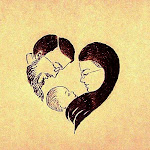Orthodox do not start with the Fall. This is very important. It means that the black-red-white-yellow-green evangelism tools of my youth are worth nothing to explain the Gospel that we live. [Black is supposed to represent sin, depravity, the post-lapsarian state, and is used as a visual
hook to show how man is evil and apart from God. Not an Orthodox approach.] It means that
angry God is an insufficient prod; while fear and guilt are excellent motivators, they do not seem to be God's
modus operandi.
Instead, Orthodox focus on the Creation. All eight days, for the day of the Resurrection, the day in which we live, is the eighth day of Creation. And it is good.
Christ's death and resurrection take care of the Fall and its problems, but His incarnation does not require the Fall. [I don't know if there are speculative Orthodox out there or no, but I would be interested to know if they think that Christ would have died and risen again had there been no Fall ... ?]
The Gospel is an invitation to share in a divine story. It is, as it was once called, possibly by Tolkien,
True Myth. It is the Platonic reality to which all other myth and story are but shadows, and only succeed as story insofar as they reflect the true myth that God has been telling us since the dawn of Creation.
"And God said ...."I think, and this is probably in large part due my Protestant upbringing, that I am susceptible to the juridical approach to Christianity.
- I mustn't make God mad...
- Oh, can't sin in that way - it will annoy Him.
- I can't confess because I don't feel guilty enough.
- I'm due for hellfire now, I tell you ...
The focus falls on doing what is right because it is right and good and God is right and good, and if I don't do it, I will be bad and I will be punished. I become an ass, led by the carrot of a sterile Paradise and followed by the switches of present guilt and the threat of eternal punishment.
Instead, the metaphors in Scripture are of journeys. We are wayfarers and sojourners, athletes running a race, disciples following Him.
So too Liturgy and the Church year teach us that Christian life is movement, and we speak of salvation over time and the "Christian walk". All these things point to the fact that we are being called, relentlessly, constantly, lovingly, "Walk with me. Follow me. Take my yoke and come."
He wants us to journey with Him, out of love, compassion for us. And He showed He means it by coming here to live with us as Christ Jesus, to be with us, suffer with us, love us.
...
It is strange. All these words feel so familiar, so like unto things I have been taught and things I have said myself once upon a time. But they feel new upon my tongue. New and different and beautiful, not jaded, time-worn, or kitsch.
And I don't really understand it, either. It is not as if the past three months were spent in penitence and prayer. I can't claim to be terribly spiritual, then or now. Or strong. All I see is the world a little brighter, old truths made new. All I see is God walking with me, even though I'm not the best of company. ... Perhaps the only difference is that I see it.
- V.



